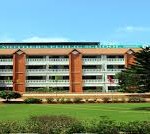
National Institute of Hotel Management & Tourism (NIHMT), Bhubaneswar is a professional school established in 2005. NIHMT has been a leader in innovation. The College has pioneered the programme which introduced the concept of ‘Earn while you Learn’ in professional education. It was also the first to introduce the Life skills programme as an integral part of education. NIHMT is committed to developing quality human resources for hospitality and allied services. The target groups of its educational/training programmes extend much beyond the organised sectors of the economy. NIHMT endeavors to nurture professional and managerial excellence, social and cultural sensitivity, moral and ethical responsibility with concern for the environment.
They visualize that NIHMT in near future would be the institute of academic excellence and a temple of learning, known for its total commitment to provide wholesome education & high quality professional development. It aims to strive for latest techniques to develop decision making abilities with a resolute approach towards productivity, excellence, innovation and value for others to enable its participants to keep pace with the changing scenario of the economy and its environs. The institute has a great team of learned teachers and equipped with all materials and resources to run the institute, it’s all set to create a new landmark in professional education
Facilities at National Institute of Hotel Management & Tourism –
- Library
- Classrooms
- Training Restaurant
- Computer Lab
- Conference Hall
- Seminar & Workshop
- Transportation
- Hostel
- Sports & Recreation
COURSES
Master Degree in Tourism and Hospitality Services:
Coverage: To gain experience in the real world of business. Through periodic workshops with prominent Tourism industry leaders and entrepreneurs and field trips, students will be put into contact with the reality of the tourism industry as well as learning how to apply the theories and skills they have learned in the classroom. Developing the personal skills vital for your future career. Through a parallel programme that seeks to explore every dimension of a student’s behaviour, attitude, and other personal skills we produce students better prepared to lead and manage people.
Bachelor Degree in Tourism and Hospitality Services:
Coverage: The training is imparted in four areas: Front office, Housekeeping, Food & Beverage Service, Engineering & Maintenance and Food Production that covers food preparation and kitchen management. Students are also taught Law, Economics, Sales and Marketing, Accounts, Management and a foreign language and, thus, equipped to manage every situation. This programme at NIHMT is affiliated to Utkal university of Culture and is recognised by UGC government of India.
P.G. Diploma in Tourism & Hotel Management
Coverage: The training is imparted in two areas: Front Office and House Keeping. Students are also taught Principles of Management, tourism, Hotel Accounts, Business Communication, Personality Development and a Foreign Language. This programme at NIHMT is autonomous.
Diploma in Tourism & Hotel Management
Coverage: The training is imparted in four areas: Front office, Housekeeping, Food & Beverage Service, Engineering & Maintenance and Food Production that covers food preparation and kitchen management. Students are also taught Law, Economics, Sales and Marketing, Accounts, Management and a foreign language and, thus, equipped to manage every situation. This programme at NIHMT is autonomous.
Certificate course in Food Production and Beverage Service:
Coverage: The training is imparted in Food Production Area. Students are also taught Computer, Communication and a Foreign language. This programme at NIHMT is autonomous.
HOSPITALITY TRAINING PROGRAMME
“HUNAR SE ROZGAR” under CBSP Scheme, Govt. of India.
The Ministry of Tourism, Government of India is conducting
following job oriented short term hospitality courses through us.
(1) Food Production Course –
Duration : 8 weeks
(2) Food & Beverage Service –
Duration : 6 weeks
Min. Educational Qual. : 8th pass and age between 18 – 28 yrs .
No course fee. Stipend will be given to only those having 90%
attendance and for them test would be conducted and certificate will be
awarded.
PLACEMENTS

|
| | - THE OBEROI
- TAJ BENGAL
- ITDC
- RAJ VILAS
- MANSINGH PALACE
- TAJ PALACE
- THE GRAND INTERCONTINENTAL
- WILD FLOWER HALL
- HYATT REGENCY
- THE OBEROI GROUP OF HOTELS
- THE TRIDENT
- LE MERIDIEN
- CLARK SHIRAZ
- CLARKS AMER
- CROWN PLAZA
- THE PARK
- RADISSON
- JAY PEE GROUP
- ITC MAURYA SHERATON HOTEL AND TOWERS
- RADHA KRISHNA HOSPITALITY SERVICES
- CLUB MAHINDHRA HOLIDAYS
- FORTUNE PARK HOTELS LTD
- RADDISON MBD NOIDA
- NIKKO
- AMBY VALLEY SAHARA LAKE CITY
| - THE TAJ GROUP OF HOTELS
- WELCOME GROUP OF HOTELS
- RADISSON WINDSOR HOTEL
- THE GRAND INTER CONTINENTAL
- DEVIGARH RESORT
- OLD WORLD HOSPITALITY PVT. LTD.
- BARRISTA COFFEE CO.
- NIRULAS CORNER HOUSE PVT. LTD
- MACDONALD’S
- GE CAPITAL
- MAJESTIC PARK PLAZA
- PIZZA HUT
- CAFÉ COFFEE DAY
- CONVERGYS
- EXCEL
- DAKSH
- ESSEX FARM
- THE PLAZA SOLITAIRE
- 3 GLOBE SERVICES PVT. LTD.MUMBAI
- PUNJAB TOURISM DEVELOPMENT CORPORATION
- TMI NETWORK
- ANANDA IN HIMALAYA’S
- Imperial’s
|








